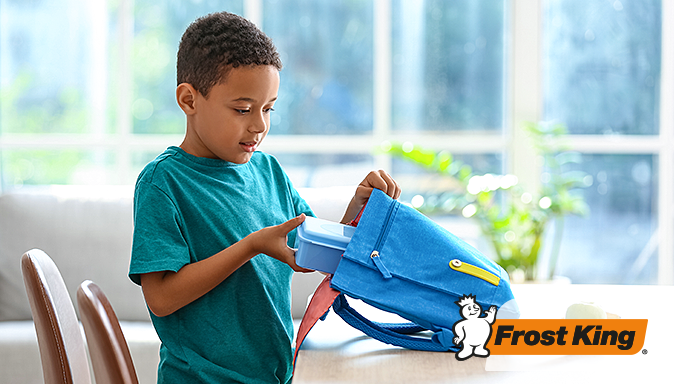It’s back to school time! Time for new teachers, new schedules, and new routines.
As you and your family get back into the swing of things, it’s a good time to teach kids eco-friendly habits to green their routine. We’ve got 5 smart tips to help you teach your kids that eco-friendly living is as easy as A, B, C!
1. Always turn off lights and ceiling fans when you leave the room. Lighting accounts for about 9% of the average homeowner’s electric bill. While energy use varies widely depending on the type of bulbs you use, it pays to teach your kids to turn off the lights whenever they leave the room—it’s a simple things even little kids can get into the habit of doing. (And if you haven’t made the switch from incandescent bulbs to energy-efficient LED bulbs yet, this might be the year you want to make the swap. According to gov, 90% of the energy incandescent light bulbs use is given off as heat, and only about 10% results in light—so during the summer months these bulbs are actually making your rooms significantly hotter.) If you use fans to cool rooms, teaching your kids to turn them off whenever they leave the room can also save you some money. Explain that fans cool people, not rooms, so there’s no benefit to running a fan in an empty room.
2. Banish single-use plastics. Aim for a “litterless lunch” by ditching the plastic baggies and plastic water bottles that are used one time and tossed, and using reusable water bottles, lunch, and snack containers that can be used over and over instead. It’s better for the planet – and over the long term, it’s better for your wallet, too.
3. Close exterior doors. You pay a lot to air condition your house in the summer and heat it in the winter—so make sure your kids aren’t letting the air you’re paying so much to heat or cool escape outside. A study of commercial buildings published by IOPScience found that during the summer months, room temperature is up to 9°F higher when the door is left open. Keep reminding your kids to close the door when they go in and out of the house to stop wasting energy and start saving money on heating and cooling bills. (And want to save even more energy? Sealing air leaks around doors and windows with weatherstripping can shave 5 to 10% off your energy bill, so check for torn or damaged weatherstripping around doors and replace it.)
4. Don’t waste water. The average family of four uses a whopping 400 gallons of water a day. Fortunately, there are easy things your kids can do to reduce water waste. Just having them turn off the tap while they’re brushing their teeth in the morning and at night can save 4 to 8 gallons of water a day—that’s more than 200 gallons a month! Same goes for washing hands: have them turn the water off while they’re soaping up to conserve even more water. You can also have your kids switch to taking showers, which use much less water than taking a bath: while filling a bathtub can use up to 70 gallons of water, a quick shower uses only 10 to 25 gallons.
5. Educate your kids about reducing waste. Shopping for new school supplies is fun, but before you head out to pick up new backpacks, binders, and scissors, check your inventory of school supplies from last year before buying new stuff. When you do buy new supplies, opt for items with minimal packaging that are made from recyclable or sustainable materials whenever possible. You can also ask your kids to think about things they can do to cut down on waste that will end up in landfills, such as starting a compost pile to reduce food waste or buying foods in bulk and portioning it out at home versus buying individual serving packets—it’s cheaper and it cuts down on wasteful packaging.
